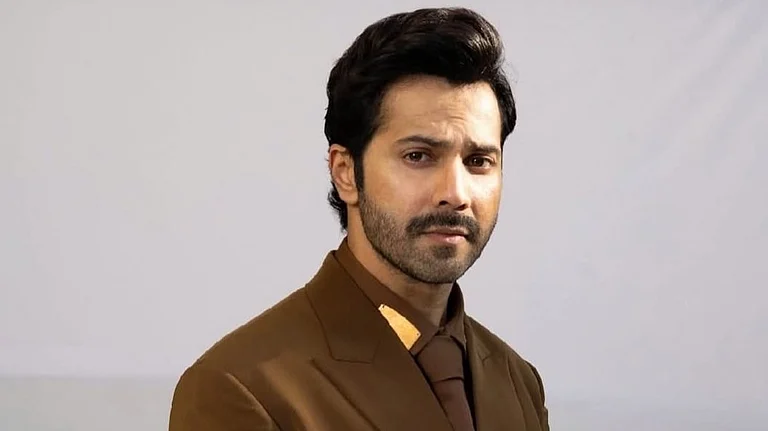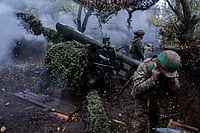The United States, European and Arab mediators have been trying to keep cross-border attacks between Israel and Lebanon's Hezbollah from spiraling any further, much less into a wider Middle East war that the world has been fearing for months.
Amid fewer hopes for a ceasefire in Israel's war on Gaza, American and European authorities have been constantly warning Hezbollah about taking on Israel's military.
They are warning the militant group that the US or anyone else would not back them if Israeli leaders decide to launch a full-blown offensive into Lebanon, adding that Hezbollah should depend on its fighter to be able to handle what comes next.
Notably, the escalating strikes between Israeli forces and Hezbollah -- one of the best-armed fighting forces in the region -- on either sides of the Lebanese border have seemingly levelled off in the past week.
Though strikes pound the border area on the regular, the slight shift from cross-border strikes have given hope of reducing the immediate fears of the people, prompting the US to send an amphibious assault ship with a Marine expeditionary force to join other warships in the region.
A former senior diplomat in the Middle East, Gerald Feierstein, said that it is not clear whether Israel or Hezbollah have decided to tone down the attacks to avoid triggering Israeli invasion into Lebanon.
He said that despite this past week's shifting of hostilities, "it certainly seems the Israelis are still... arranging themselves in the expectation that there will be some kind of conflict... an entirely different magnitude of conflict."
The message being delivered to Hezbollah is “don't think that you're as capable as you think you are”, he said.
Since Hamas launched an unprecedented attack on Israel on October 7, 2023 and the latter's retaliation, Hezbollah has been launching rockets into northern Israel and vowed to continue until a ceasefire was reached.
Attacks between the two heated up this month after Israeli forces killed a top Hezbollah commander and the militant group responded with launching some of its biggest missile barrages.
What the war between Hezbollah and Israel could result in was described as "apocalyptic" by UN humanitarian chief Martin Griffiths. Both of the sides have the power to cause massive casualties.
As he recently met Israeli Defence Minister Yoav Gallant at the Pentagon, US Defence Secretary Lloyd Austin said, "Such a war would be a catastrophe for Lebanon."
“Another war between Israel and Hezbollah could easily become a regional war, with terrible consequences for the Middle East," Austin added.
In response, Gallant said that Israel and Lebanon are working closely to achieve an agreement, "but we must also discuss readiness on every possible scenario".
Other Iran-allies militias in the region are expected to respond with much more force for Hezbollah than they did for Hamas, believe experts, adding that some ideologically motivated militants could also join in.
Though Iran, busy with its own political transition following Ebrahim Raisi's death, does certainly not seem like it wants a war at the moment. However, it is notable that it considers Hezbollah to be a strategically vital partner in the region and so could be drawn in.
The former senior US diplomat, Feierstein said, "Obviously if it does look like things are going seriously south for the Israelis, the US will intervene. I don't think that they would see any alternative to that.”
General CQ Brown, chairman of the Joint Chiefs of Staff, said that though the US helped Israel knock down a slew of Iranian missiles and drones in April, it would not do so in case of Israel's defence against Hezbollah attacks.
It is harder to fend off the shorter-range rockets that Hezbollah launches routinely across the border, he added.
While Israeli forces are stretched out at present following an almost nine-month-long war on Gaza, Hezbollah enjoys an estimated arsenal of some 1,50,000 rockets and missiles. The barrage of missiles of the militant group are capable of striking anywhere in Israel, however the latter has pledged to unleash a Gaza-like destruction on Lebanon in the event of a full-fledged war.
With ties as Lebanon's former colonial power, France is also involved in the mediation with other Europeans, Qataris and Egyptians.
White House officials have accused Hezbollah for the escalation of tensions and said that it supports Israel's right to defend itself.
However, the Biden administration has told Israel that opening a second front would not be in their interest. This was also made clear to Israeli Defence Minister Yoav Gallant when he recently held talks with US Secretary of State Antony Blinken, CIA Director William Burns, National Security Advisor Jake Sullivan, Lloyd Austin and others.
White House national security spokesman John Kirby said, "“We're going to continue to help Israel defend itself; that's not going to change, adding that "but as for a hypothetical -- specially with respect to the northern border line -- again, we want to see no second front opened, and we want to see if we can't resolve the tensions out there through diplomatic processes."
The real possibility of a second front being opened in the Mid-East conflict is not being discounted by the White House officials.
A senior Biden administration official said that in the tacks with Israeli and Lebanese officials and other stakeholders in the region, it was established that a "major escalation is not in anybody's interest".
The official was bridled at the "purported logic" of Hezbollah leader Hassan Nasrallah arguing that Israel would see an end to the militant group's attacks by reaching a ceasefire agreement with Hamas in Gaza.
However, the official also acknowledged the contribution a ceasefire deal in Gaza could make to easing the tensions in the Israeli-Lebanese border.
US President Joe Biden had proposed a three-phase deal last month for a truce between Israel and Hamas and the release of hostages. However, negotiations between the two sides in conflict seems to have come to a halt.
A senior official from the US administration had on Saturday said that they have presented new language to Egypt and Qatar intermediaries with a hope to stir the negotiations again.
Randa Slim, a senior fellow at the Middle East Institute, said that Israel's talked-of plans of massive offense in Gaza's southern city of Rafah and anywhere else could potentially trigger Hezbollah into launching its missiles barrage into Israel.
But without a cease-fire in Gaza, any temporary solution on the Lebanon-Israeli border “is not enough," Slim said.
(With AP inputs)



























